The What Makes A Man conversation continues in Dubai…
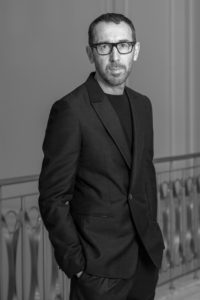
Zegna’s Artistic Director, Alessandro Sartori
Ermenegildo Zegna opened a new chapter earlier this year with its What Makes A Man concept. Starring Oscar-winning actor Mahershala Ali, the concept was much more than just an advertising campaign, it opened a new conversation about what it means to be a man today and what modern masculinity really is. When the campaign launched earlier this year, A&E was in New York to discover more about the conversation and learn why it is important to the brand and now, this November Zegna brought the conversation to Dubai. At the heart of the campaign is Zegna’s Artistic Director Alessandro Sartori. With his forward-thinking approach to design Sartori has been pivotal in transforming the men’s luxury fashion industry. By redefining the codes of men’s fashion, Sartori has taken Zegna to the next level combining the finest in tailoring with modern sportswear to create something that’s instantly recognisable.
With that in mind, it seemed like the perfect time to open up the conversation. As Dubai became one of the few cities to host this conversation A&E came together with Zegna to present an exclusive event discussing the codes of masculinity with Alessandro Sartori. Here the Artistic Director talks more on the conversation and we get an exclusive insight into the “What Makes A Man” campaign and the thought process behind Sartori’s designs.
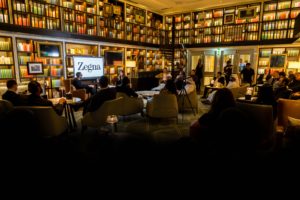
Alessandro Sartori in Dubai
What led you to the decision to open this conversation to the world?
We decided to enter into a different method for our advertising campaign, mostly to tell a story that was not only about fashion. We are used to seeing photos of models with powerful cars or beautiful partners, but we wanted to enter into a different conversation that talks about human values and real stories. We wanted to re-start the conversation that the founder of Zegna; Ermenegildo Zegna, had in 1910. He created a mission which was very unusual for the time. He wanted to create the most beautiful fabrics in the world, involving and respecting the community and taking care of the environment. Zenga still shares these values today. It’s important to realise that people are not coming to Zenga just to buy products but to create their own image or style. So yes it is about the products, but mostly it’s about values and real things that each person can interpret differently. So, we decided to open this conversation with the “What Makes A Man” campaign because each man will give a different answer, so it’s very interesting to enter into a conversation that is not only about products and photos but about real lives.
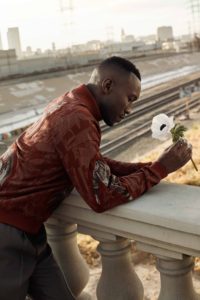
The What Makes A Man Campaign starring Mahershala Ali
Tell us a little bit about the campaign – why did you select Mahershala Ali to front this campaign and how has it been perceived so far?
First of all, Mahershala is a friend. We didn’t decide to work with him before knowing him. The friendship has been going on for a few years since we met him in Los Angeles. We do a lot of different activities around the world and at the time we were introducing our exclusive collection for the red carpet. So we went there with thirty silhouettes, each one made exclusively for actors or people in the entertainment business. All of the stylists came to see the products for their customers, but Mahershala came himself. Rather than sending a stylist, he wanted to see the products with his own eyes and touch them with his hands to feel the fabric. After that, we dressed him for red carpet events for Moonlight and Green Book and we had a lot of fascinating conversations. He is a very trusting man, a beautiful person. He believes in family values, is very interested in religion, and he is a very deep guy. When we decided on this concept we said ‘why not him?’ One interesting thing is that the campaign was not scripted. We were filming constantly during the day because Mahershala wanted to speak about himself and his own reality. We didn’t tell him what to say, we just dressed him and told him to speak about himself and his values.
Why did you choose Dubai to be one of the cities to present this story?
The first reason is that I’m very interested to know what people in Dubai think about the campaign. I’m curious to hear people’s comments on the campaign both positive and negative. So far we have had mostly enthusiastic feedback. We have previously had people in some parts of the world ask us why we don’t talk about other values aside from fashion, so that’s why we decided to talk about who we really are, and take care of our men and it is interesting to hear their opinions.
A few months ago I met with the CEO of Uniqlo. He told me a very interesting story. Our CEO asked him how he sees the world evolving and how he sees the evolution of different countries and regions. He said; “I think in the future it won’t be about booming markets any more, it will be about booming cities.” He said that Dubai is one of those cities. He actually mentioned three – Dubai, Bangkok and Singapore. I agree with him and I think Dubai is going to have its moment to shine. We like the idea of approaching the market in a totally different way. Introducing a bespoke service for example, and also creating a unique product for the market itself.
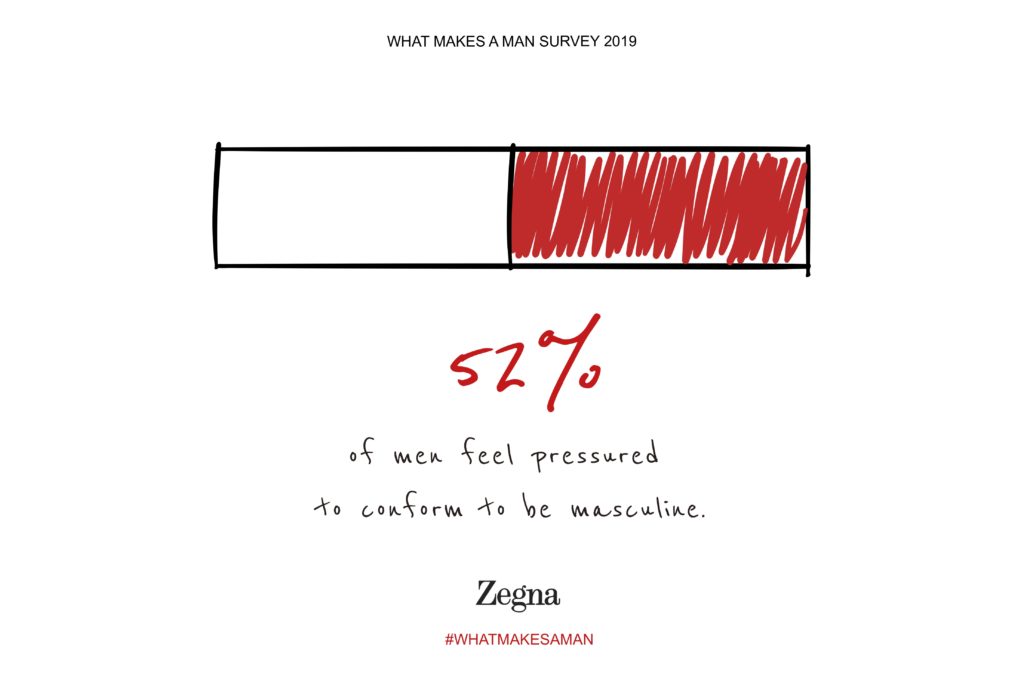
What Makes A Man Survey
How do you think fashion helps this conversation roll out?
I think fashion is changing and has to keep changing. You see many brands disappearing and many new brands entering the market. What is really important to me and to Zegna are our values. This campaign is actually changing our mindset and encouraging us to design the collection differently. We are designing garments that will be in a man’s wardrobe for a very long time, if possible; forever! This means a lot – it means different fabrics, a different approach to the construction and a different construction inside. I will tell you a little secret. If you open the lining you will understand the quality. Inside the lining in our jackets you will see there is space to change the garment by at least one size. When we create the shoulders and the sleeves we make it possible to be able to change the shoulders or the sleeves if your size changes. So the durability and the resilience is becoming a very important aspect at Zegna.
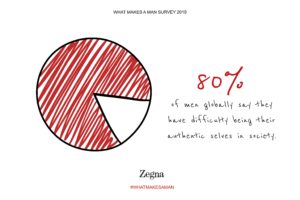
What Makes A Man Survey
Going back to the pillars of the campaign, can you tell us what failure means to you?
If you can deal with failure it makes you a much better person and you become much more conscious of what you do. I have had many moments where I’ve failed but I’ve learnt to stand up again and react positively and it made me feel better.
Moving onto the journey – what is a challenge that you came across during your journey that taught you a lesson?
I think every day you face a lot of difficulties. As far as myself and the type of work I do, managing people is the most challenging part as there are many different characters to deal with. Designers can be very sensitive people. They are very passionate about what they do, so I have to be very good at pushing them as much as I can in the right direction but not stopping them during their creative process. So the biggest challenge for me would probably be managing creative people.
What do you say no to?
Bad taste! Fashion is ultimately about creating beauty. When you understand that designing for people is not only to do business but it’s also to make people feel better, more confident and proud – you shouldn’t create anything that reflects bad taste because you want people to feel good wearing what you have created.
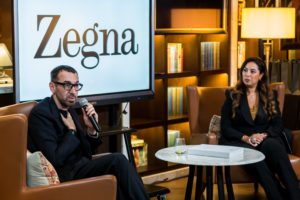
Alessandro Sartori and A&E Editor in Chief Lara Mansour
Moving on to love – to what extent do you think it is crucial to love yourself nowadays?
It’s very important. If you’re always worried to love, then you will never get the chance to get to where you want to go. It’s not the result that is important, it is the journey. A lot of the time when we do shows, we’re working like crazy, but in the end, the show only lasts eight minutes. It is over so fast that you don’t even know what you’ve done! So the journey is very important and if you live your journey with love it’s even better.
How did you first discover your passion for design?
My mum was a tailor. When I was around four or five my father bought the apartment next door for my mother to use as an atelier. So as a young boy I used to go in between our apartment and my mum’s atelier. So I started to become interested in what she was doing and it became my real passion. I started to design clothes when I was very young and at 15 I created my own suit. It was a disaster! I won’t show you, but it taught me how to sew and the process of making garments.
What do you do when you want to disconnect and get inspired?
I would like to come to Dubai for longer! I also like driving vintage cars. That’s how I de-stress. I drive them in beautiful places. I go to Tuscany or over to France and I drive not on highways but through little streets. That’s my passion and I also like to take beautiful photos. These are the two relaxing activities that allow me to think.
What is a life lesson you’ve learnt during your journey?
Everything is related to how you feel and what you believe. So the lesson that has taught me the most is that the more you believe in something deeply and act with all the love and passion you can, you will be able to achieve your dream.
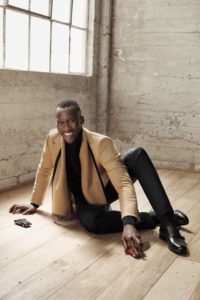
The What Makes A Man Campaign
Speaking of dreams – what is something that you haven’t yet achieved that you would still like to do?
This is very much related to this crazy mindset that came into our mind a couple of years ago. I have a friend who is a chef and we were talking about wasted food. There is an organisation in Milan that will take wasted food and create new food for poor people. And we have started to look into this idea in relation to fashion. We have a very interesting project at Zegna called “Use the Existing.” We take all of our wool and cashmere fibres from Australia, New Zealand, South Africa and Mongolia. We are lucky that at Zegna we handle the full process ourselves. We wash the fibres down, then we spin them and we create the fabric. During this process, we lose twenty per cent of the fibres. This is due to broken fibres, different qualities or different colours. Then when we cut the fabrics to make the garments we lose another twenty-five per cent. All the parts that are outside of the pattern when we cut the fabric are wasted. And then at the end of the process, we have the garments that aren’t sold. So we are losing forty-five per cent of the total, which is a huge amount. So we are now taking this forty-five per cent and creating new products out of it. I aim to reduce the waste to zero.
Speaking a little bit on freedom, we know that in recent years you have liberated the codes and stereotypes of men’s fashion in the ways that you design your collections – what can you tell us about that?
I like the idea of interplaying tailoring and sportswear. The idea of placing tailored jackets with sportswear pants, putting a tailored technique into sportswear jackets or vice versa. I love that connection. I also like to use non-traditional colours like camel, olive, brown – all these beautiful deep colours and blend them with classic tones. I think there are a lot of possibilities in menswear and a lot of playing with techniques and technologies that we can do. New categories are definitely entering the men’s wardrobe – jersey, for example, is becoming more important. Accessories are more important, so it’s really interesting to see the changes.
We know that sustainability is a topic that is very close to your heart – what more can you tell us about that?
It is very important. We have a project to use zero chemicals, so we are using leaves and herbs to dye our fabrics. We have a project that’s working on organic wool which we are doing in Australia. And generally, our designs are having a very different and more clever approach when it comes to sustainability.
We are entering a beautiful era where sustainability is a fact and we have a lot of modern products related to this including our use of cotton, reducing water consumption, reducing the waste of our fabric and fibres and using the waste to create something new. So yes we are entering a very different mindset. We still have beautiful designs, but this campaign is also affecting what is behind the designs.
Next year will be the 110th anniversary of Zegna – how would you describe Zegna today?
A company and family that takes care of the customers with real values behind it. Actually, for the 110th anniversary, I want to come to Dubai and since you have the Expo it would be fantastic!
What is the message that you are always keen to pass on at Zegna?
To keep the legacy, but to look forward.















